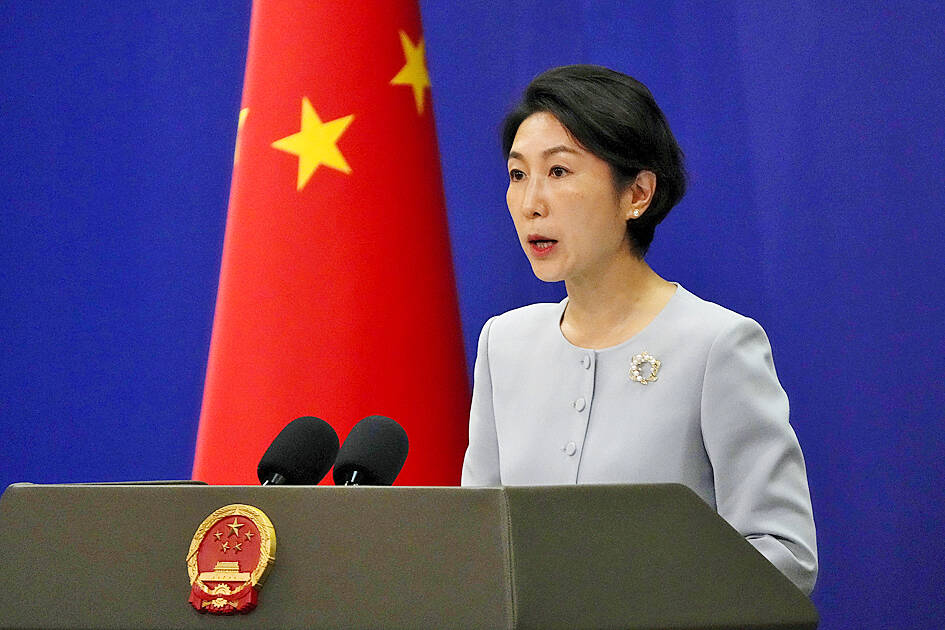New Zealand’s spy service yesterday branded China a “complex intelligence concern” and warned that the nation was vulnerable to foreign interference.
In an annual threat report, the New Zealand Security Intelligence Service said that several countries were undertaking “malicious activity” on its shores, but called out China’s attempts as “complex and deceptive.”
In particular, Beijing was accused of using front organizations to connect with local groups to replace authentic and diverse community views with those approved by the ruling party.

Photo: AP
In one example, a Chinese-language community news outlet parroted Beijing’s talking points, it said.
“These front organisations will often appear to be community-based ... but their true affiliation, direction and funding sources are hidden,” the report said.
The unusually blunt language comes as New Zealand’s recently elected center-right government tilts the nation’s foreign policy more closely toward traditional Western allies. This comes after years of growing economic ties with China — New Zealand’s biggest trade partner.
In March, Wellington publicly said that a Chinese state-sponsored group was behind a 2021 malicious cyberattack that infiltrated sensitive government computer systems.
Beijing dismissed allegations of hacking and accused New Zealand critics of being puppets of the US.
Asked about the spy report, Beijing yesterday said that it would “never interfere in the internal affairs of any other country.”
“We hope the New Zealand side will maintain a rational and objective understanding of China, and create favorable conditions for the development of healthy, stable relations between the two countries,” Chinese Ministry of Foreign Affairs spokeswoman Mao Ning (毛寧) said.
New Zealand’s spy agency said the country’s geographical position and role in the Pacific region made it “vulnerable” to other countries striving for greater influence.
That included Russia, which “likely monitors the public statements and social media accounts” of people, it said.
In another case, an unnamed country contacted a local New Zealand council and offered to pay for a community event if they agreed to restrict a particular religious group.
The report aimed to be upfront about threats facing the country, Security Intelligence Service Director-General Andrew Hampton said.
“The point is not to alarm anyone, but to alert New Zealanders to the threats so that we can work together to manage them,” he said.
Earlier this year, New Zealand Prime Minister Christopher Luxon said the country could no longer depend on the “splendid isolation” provided by its geography.
China remains New Zealand’s biggest trading partner — exporting dairy, meat and wood products that exceeded NZ$21.39 billion (US$13.2 billion), official data showed.
Luxon has warned that although China was “a country of undoubted influence,” different values mean “there are issues on which we cannot and will not agree.”

CHAOS: Iranians took to the streets playing celebratory music after reports of Khamenei’s death on Saturday, while mourners also gathered in Tehran yesterday Iranian Supreme Leader Ayatollah Ali Khamenei was killed in a major attack on Iran launched by Israel and the US, throwing the future of the Islamic republic into doubt and raising the risk of regional instability. Iranian state television and the state-run IRNA news agency announced the 86-year-old’s death early yesterday. US President Donald Trump said it gave Iranians their “greatest chance” to “take back” their country. The announcements came after a joint US and Israeli aerial bombardment that targeted Iranian military and governmental sites. Trump said the “heavy and pinpoint bombing” would continue through the week or as long

TRUST: The KMT said it respected the US’ timing and considerations, and hoped it would continue to honor its commitments to helping Taiwan bolster its defenses and deterrence US President Donald Trump is delaying a multibillion-dollar arms sale to Taiwan to ensure his visit to Beijing is successful, a New York Times report said. The weapons sales package has stalled in the US Department of State, the report said, citing US officials it did not identify. The White House has told agencies not to push forward ahead of Trump’s meeting with Chinese President Xi Jinping (習近平), it said. The two last month held a phone call to discuss trade and geopolitical flashpoints ahead of the summit. Xi raised the Taiwan issue and urged the US to handle arms sales to

BIG SPENDERS: Foreign investors bought the most Taiwan equities since 2005, signaling confidence that an AI boom would continue to benefit chipmakers Taiwan Semiconductor Manufacturing Co’s (TSMC, 台積電) market capitalization swelled to US$2 trillion for the first time following a 4.25 percent rally in its American depositary receipts (ADR) overnight, putting the world’s biggest contract chipmaker sixth on the list of the world’s biggest companies by market capitalization, just behind Amazon.com Inc. The site CompaniesMarketcap.com ranked TSMC ahead of Saudi Aramco and Meta Platforms Inc. The Taiwanese company’s ADRs on Tuesday surged to US$385.75 on the New York Stock Exchange, as strong demand for artificial intelligence (AI) applications led to chip supply constraints and boost revenue growth to record-breaking levels. Each TSMC ADR represents

State-run CPC Corp, Taiwan (CPC, 台灣中油) yesterday said that it had confirmed on Saturday night with its liquefied natural gas (LNG) and crude oil suppliers that shipments are proceeding as scheduled and that domestic supplies remain unaffected. The CPC yesterday announced the gasoline and diesel prices will rise by NT$0.2 and NT$0.4 per liter, respectively, starting Monday, citing Middle East tensions and blizzards in the eastern United States. CPC also iterated it has been reducing the proportion of crude oil imports from the Middle East and diversifying its supply sources in the past few years in response to geopolitical risks, expanding